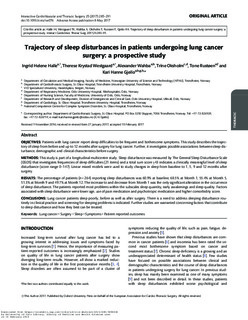Trajectory of sleep disturbances in patients undergoing lung cancer surgery: A prospective study
Halle, Ingrid; Westgaard, Therese Krystad; Wahba, Alexander; Oksholm, Trine; Rustøen, Tone; Gjeilo, Kari Hanne
Journal article, Peer reviewed
Published version
Permanent lenke
http://hdl.handle.net/11250/2485978Utgivelsesdato
2017Metadata
Vis full innførselSamlinger
Originalversjon
Interactive Cardiovascular and Thoracic Surgery. 2017, 25 (2), 285-291. 10.1093/icvts/ivx076Sammendrag
OBJECTIVES
Patients with lung cancer report sleep difficulties to be frequent and bothersome symptoms. This study describes the trajectory of sleep from before and up to 12 months after surgery for lung cancer. Further, it investigates possible associations between sleep disturbance, demographic and clinical characteristics before surgery.
METHODS
This study is part of a longitudinal multicentre study. Sleep disturbance was measured by The General Sleep Disturbance Scale (GSDS) that investigates frequencies of sleep difficulties (21 items) and a total sum score ≥43 indicates a clinically meaningful level of sleep disturbance (score range 0–147). Linear mixed models were used to study changes in sleep from baseline to 1, 5, 9 and 12 months after surgery.
RESULTS
The percentage of patients (n = 264) reporting sleep disturbances was 60.9% at baseline, 68.5% at Month 1, 55.4% at Month 5, 51.3% at Month 9 and 49.7% at Month 12. The increase to and decrease from Month 1 was the only significant alteration in the occurrence of sleep disturbance. The patients reported most problems within the subscales sleep quantity, early awakenings and sleep quality. Factors associated with sleep disturbance were lower age, use of pain medication and psychotropic medication and higher comorbidity score.
CONCLUSIONS
Lung cancer patients sleep poorly, before as well as after surgery. There is a need to address sleeping disturbance routinely in clinical practice and screening for sleeping problems is indicated. Further studies are warranted concerning factors that contribute to sleep disturbance and how they best can be treated.
